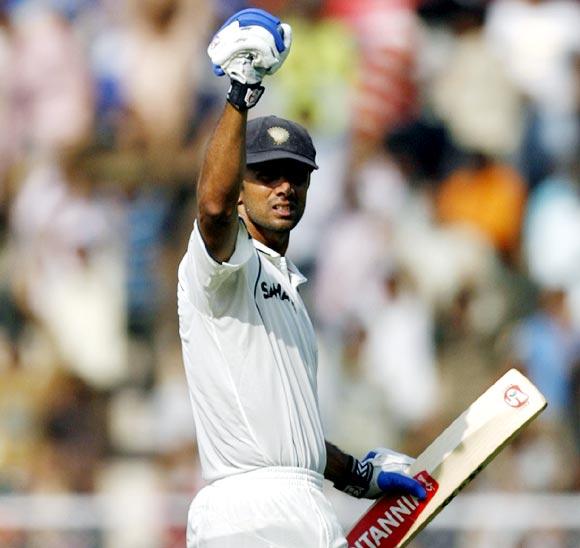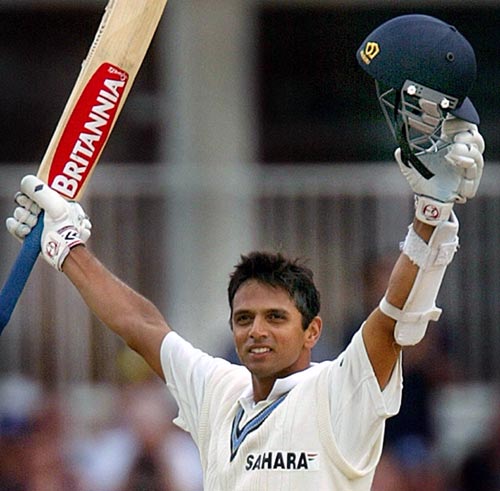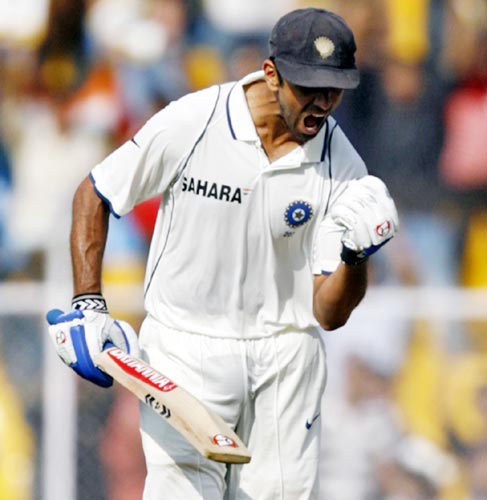Photographs: Reuters
For batting ace Rahul Dravid, says Bikash Mohapatra, it was not just about playing the game. It was about playing it with dignity.
Even as you read this Rahul Dravid will be giving finishing touches to his final speech to the media.
Ever since a BCCI intimation about him coming in for a media conference did the rounds, it didn't take long to realize the purpose for the same.
- Bowling will determine our Test future, says Dravid
The veteran batsman had decided to call it a day. Friday's press conference is but an official statement to the effect.
The debacle Down Under led to many criticizing the performance of the senior players and demanding they make way for the younger lot, keeping the future in mind. Many former players and experts were of the opinion that the only way out of this rut was to have the selectors look ahead and give youngsters the opportunity, something even captain Mahendra Singh Dhoni asserted again and again during the tour.
Seniors came under scrutiny after disasters in England and Australia
Photographs: Reuters
The shoddy show in Australia, where Team India had been considered as favourites to score a first ever win going into the series, came close on the heels of an equally disastrous tour of England.
It was imperative, therefore, that the senior players took the bulk of the responsibility for the dual disasters.
- Rahul Dravid on how Team India can get back to No. 1
Big names like Sachin Tendulkar, VVS Laxman and Dravid -- or for that matter even Virender Sehwag and Zaheer Khan -- came under scrutiny, their position in the team questioned and the age-factor derided. However, the BCCI, not surprisingly, didn't react to all the suggestions (and speculations).
Neither did the players in question. Save one. Expectedly, it was Dravid.
Dravid failed to deliver Down Under
Photographs: Reuters
It did not take long for the 39-year-old to make up his mind. He had failed to deliver Down Under -- managing only 194 runs in eight innings (at a measly average of 24.25) -- and he knew that. More importantly, for someone everyone loves calling 'The Wall' his defense had been breached six times in his last eight innings.
Before the selectors could take a call on his future, he chose to do it himself.
It is not as if his poor show in Australia would have hastened his departure from the team. Dravid had scored more than a thousand runs in 2011 -- inclusive of five centuries -- and had broken many records en route.
Not to forget his performance – an aggregate of 461 runs in the four matches (@ 76.83) – was the only saving grace for India in an otherwise forgettable tour of England. (The other senior players named above were failures in both the tours) Enough reason for the selectors to persist with him.
However, for Dravid it was not just about playing the game. It was about playing it with dignity.
Dravid didn't let the selectors take him for granted
Photographs: Reuters
It was this self-respect that had made him bring down the curtains (officially) on his one-day career last August.
Then the selectors, either impressed by his form in England or because of lack of it from others, had surprisingly recalled him for the ODI series.
Dravid was not part of the One-Day team since playing against the West Indies in the ICC Champions Trophy in September 2009 and had missed India's successful World Cup campaign earlier that year and had assumed he won't ever be selected again for the shorter format.
The surprise call-up, after almost two years on the sidelines, had hurt his self respect. It also prompted him to make a decision.
An impromptu media conference was arranged and the player made an announcement, that India's fifth game against England at Cardiff would be his final One Day International.
The gentleman that he was, he respected the selectors' decision and played out the series that followed. At the same time, his self respect had made him decide he wouldn't let the selectors take him for granted.
Dravid did a commendable job as captain
Photographs: Reuters
Another instance of the same pertains to Dravid's captaincy.
The Karnataka player had replaced Sourav Ganguly as the ODI captain in October 2005 and assumed the position in the Test side shortly after.
To be fair to Dravid, he did a commendable job as a leader, leading the team amongst others, to a first Test series win over West Indies in the Caribbean for 35 years in 2006 followed by a first series win on English soil in 21 years the following year.
In the 25 Tests that he led Team India, he had a winning record (8-6). And during the 62 ODIs under his leadership, India set a record for 16 consecutive successful chases. Besides, his captaincy didn't affect his batting either - he averaged 51 in Tests and 44 in ODIs as a captain.
However, the fact that his predecessor (Ganguly) was a popular captain, and had been unceremoniously dumped from the team, meant there were conspiracy theories abound during Dravid's tenure as captain.
There were many who believed his proximity to the incumbent coach (Greg Chappell) led to his appointment. Others opined that he wasn't as aggressive a captain as Ganguly was. Whatever the case, his critics were always on the look out for opportunities to run him down.
And Team India's early exit from the 2007 World Cup, having gone in to the tournament as the favourites, made them go overboard. A 3-4 defeat to England in the NatWest series gave them more fodder.
Though he never reacted to any of the criticisms, Dravid used the time to deliberate.
In September 2007, he made his announcement. He resigned as captain with immediate effect.
'I enjoyed the captaincy, I loved it, but it can get tough after a while and some of the enjoyment can go away. So I thought it was the right time to step aside,' he was quoted as saying, a simple explanation for a not so simple decision.
His peers and juniors looked up to him
Photographs: Reuters
These instances reiterate the fact that in a team where a majority of the players don't hesitate to spout abuses (in the guise of aggression) at every available opportunity and where self-esteem is an unheard of attribute, Dravid remained a dignified cricketer. One for whom respect mattered more than anything else. One who could perhaps be criticized for his non-performance but never for his conduct (both on and off the field). And one his peers and juniors looked up to.
It is this attribute that influenced many of his career decisions. It is this self-respect that made him decide to call it quits rather than be at the mercy of the selectors.







Comment
article